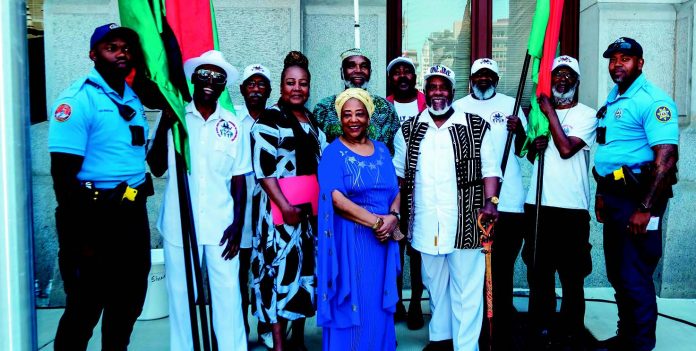Juneteenth is the oldest known celebration commemorating the ending of slavery in the United States. Dating back to 1865, it was on June 19 that Union soldiers, led by Major General Gordon Granger, landed at Galveston, Texas–with news the war had ended, and the enslaved were now free. Note that this was two and a half years after President Lincoln’s Emancipation Proclamation–which had become official January 1, 1863. The Emancipation Proclamation had little impact on the Texans due to the minimal number of Union troops to enforce the new Executive Order. However, with the surrender of General Lee in April of 1865, and the arrival of General Granger’s regiment, the forces were finally strong enough to influence and overcome the resistance.
Later attempts to explain this two and a half year delay in this important news have yielded several versions handed down through the years. Often told is the story of a messenger who was murdered on his way to Texas with the news of FREEDOM. Another is that the news was deliberately withheld by the enslavers to maintain the labor force on the plantations. Yet another is that federal troops actually waited for the slave owners to reap the benefits of one last cotton harvest before going to Texas to enforce the Emancipation Proclamation. All or none of these versions could be true. Certainly, for some, President Lincoln’s authority over the rebellious states was in question. For whatever the reason, conditions in Texas remained status quo well beyond what was statutory.
One of General Granger’s first orders of business was to read to the people of Texas, General Order Number 3, which began most significantly with:
“The people of Texas are informed that in accordance with a Proclamation from the Executive of the United States, all SLAVES ARE FREE. This involves an absolute equality of rights and rights of property between former masters and slaves, and the connection heretofore existing between them becomes that between employer and free laborer.”
The reactions to this profound news ranged from pure shock to immediate jubilation. While many lingered to learn of this new employer to employee relationship, many left before these offers were completely off the lips of their former masters, attesting to the varying conditions on the plantations and the realization of freedom. Even with nowhere to go, many felt leaving the plantation would be their first grasp of freedom. North was a logical destination–and for many it represented true freedom, while the desire to reach family members in neighboring states drove the some into Louisiana, Arkansas and Oklahoma. Settling into these new areas as free men and women brought on new realities and the challenges of establishing a heretofore non-existent status for Black people in America. Recounting the memories of that great day in June of 1865 and its festivities would serve as motivation as well as a release from the growing pressures encountered in their new territory.
The celebration of June 19 was coined “Juneteenth” and grew with more participation from descendants. The Juneteenth celebration was a time for reassuring each other, praying and gathering remaining family members. Juneteenth continued to be highly revered in Texas decades later, with many former slaves and descendants making an annual pilgrimage back to Galveston on this date.
A range of activities are traditional on Juneteenth, including rodeos, fishing, barbecuing and baseball. But Juneteenth almost always focused on education and self-improvement. Speakers are brought in to events, elders are called upon to recount the events of the past, and prayer services were also a major part of these celebrations. The barbecue pit is often established as the center of attention at Juneteenth events.
Dress was also an important element in early Juneteenth customs. During slavery there were laws on the books in many areas that prohibited or limited the dressing of the enslaved. During the initial days of the emancipation celebrations, there are accounts of former slaves tossing their ragged garments into the creeks and rivers to adorn clothing taken from the plantations belonging to their former masters.
Economic and cultural forces caused a decline in Juneteenth activities and participants beginning in the early 1900s. The Depression forced many people off the farms and into the cities to find work–where employers were less eager to grant leaves to celebrate this date. Thus, unless June 19 fell on a weekend or holiday, there were very few participants available. July 4 was the already established Independence holiday, and a rise in patriotism steered more toward this celebration.
But the Civil Rights movement of the 50s and 60s yielded both positive and negative results for the Juneteenth celebrations. While it pulled many of the African-American youth away and into the struggle for racial equality, many linked these struggles to the historical struggles of their ancestors. This was evidenced by student demonstrators involved in the Atlanta civil rights campaign in the early 1960s, who wore Juneteenth freedom buttons. Again in 1968, Juneteenth received another strong resurgence through the Poor Peoples March to Washington D.C. and the Rev. Ralph Abernathy’s call for people of all races, creeds, economic levels and professions to come to Washington to show support for the poor. Many of these attendees returned home and initiated Juneteenth celebrations in areas previously absent of such activity. In fact, two of the largest Juneteenth celebrations founded after this march are now held in Milwaukee and Minneapolis.
Today Juneteenth is finally recognized as a national holiday and is enjoying a phenomenal growth rate throughout the country, and many states are beginning to recognize the holiday as well. Institutions such as the Smithsonian, the Henry Ford Museum, and others sponsor Juneteenth-centered activities to promote and cultivate knowledge and appreciation of African-American history and culture. Juneteenth today celebrates African American freedom and achievement, while encouraging continuous self-development and respect for all cultures.


